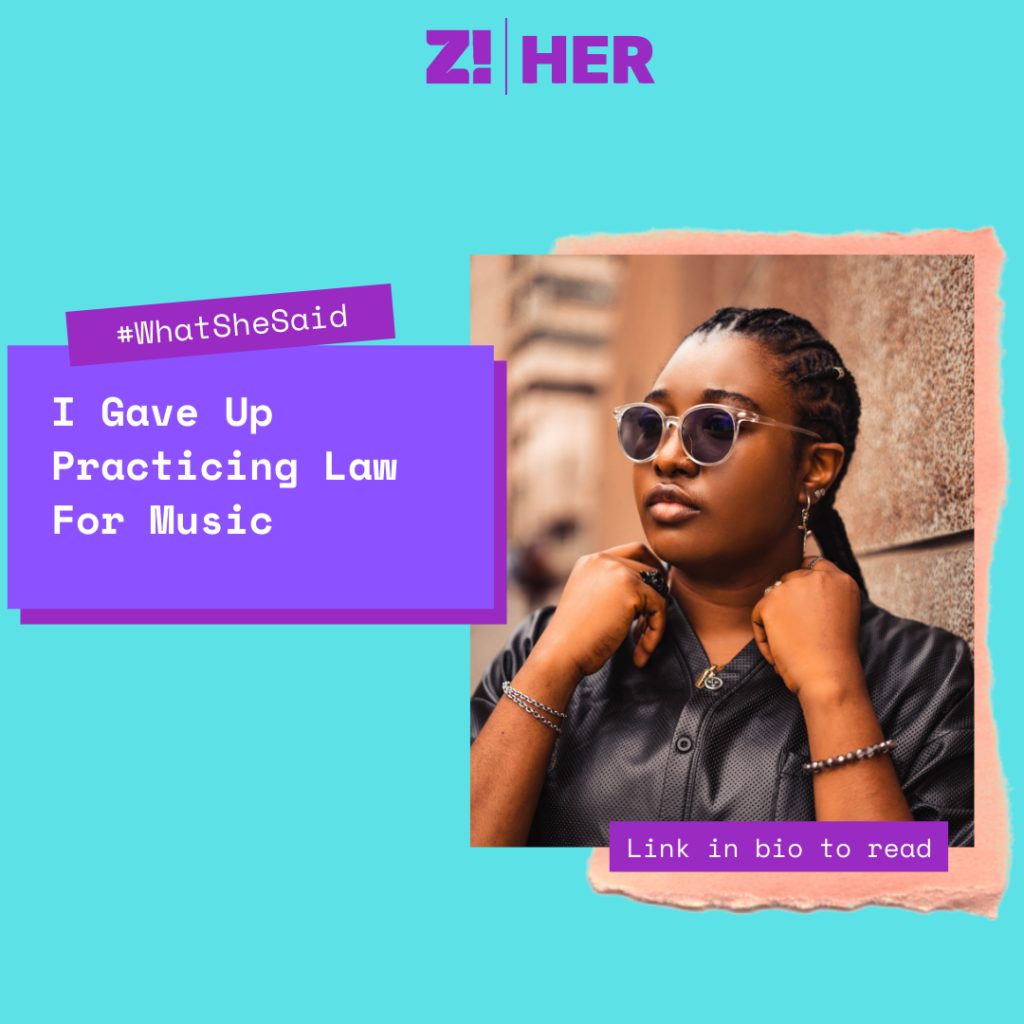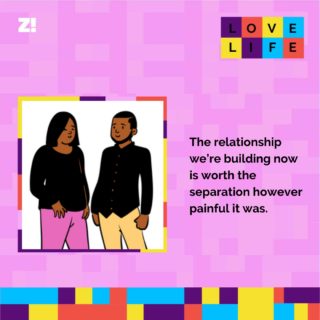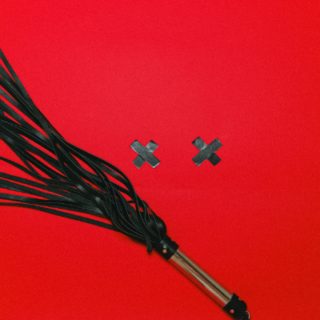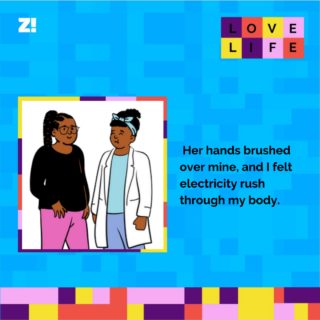Navigating life as a woman in the world today is interesting. From Nigeria to Timbuktu, it’ll amaze you how similar all our experiences are. Every Wednesday, women the world over will share their experiences on everything from sex to politics right here. This is Zikoko’s What She Said.

The subject of this week’s What She Said is Marytonette ‘Biwom’ Okudare, a 26-year-old singer and songwriter. She talks about growing up as a tomboy, failing at convincing her parents to support her music career and struggling with being taken seriously because of her style.
What was your childhood like?
It was restrictive. My mum was strict — she didn’t let me go out, but I was quite stubborn. After school, I would go and play football with the guys. My mum would beat me when I did this, but I didn’t mind. I always stayed back after school to play football.
Despite being so active in sports, I didn’t have any friends. I was a tomboy who hung with the guys. I wasn’t interested in the girl stuff. After football, I would go home, and it would be just me and my brother. My younger brother and I were so close we were like twins.
Everything was cool until I was sent to boarding school.
What was boarding school like?
Hectic. I was nine years old and had never been on my own. I started falling sick and missing my brother. Leaving him was so hard for me. Soon after, I started running back home.
One time, my parents dropped me off at school and by the time they reached the house, I had gotten home. They were frustrated, but I was scared of everything at school — being flogged, senior students and my teachers. I was the youngest person in my class at the time, so my classmates bullied me. They would shout at me or send me to fetch water for them. There was this girl that made sure she sat next to me during tests and exams so she could copy my work. She would legit drag the paper from me if I tried to hide it. I am still looking for her on the internet so I can ask her what’s up.
Aside from the bullying, secondary school was good. I spent my free time playing football. I also sang and joined my school’s drama club. At school competitions, I rapped. I even did comedy. It was all fun. In SS 2, I became a prefect, so I had more power.
Sorry you had to go through all that.
Thanks. It wasn’t all bad. I was active in sports and social activities so I became popular. People liked my style. During sports, I would fold the sleeves of my T-shirt, pull my shorts over my buttocks, wear a bandana on my head and bounce around. I enjoyed that. There were also other girls like me, so I was comfortable being myself. I rarely wore the dresses my parents got me. I preferred to wear the tracksuits my elder brother sent us from the US. My parents eventually stopped buying me dresses.
What was university like?
I studied law at the University of Calabar. I didn’t want to study law, but I graduated secondary school at 14, so my parents filled my JAMB form for me. I wanted to study theatre arts but my parents said it wasn’t a real course — they wanted me to be a lawyer.
When it was time for JAMB, I went to the examination hall and intentionally ticked the wrong answers. I failed JAMB twice. By my third attempt, I was 16 and my mates were all in university. Some were even getting ready to graduate. That’s when I decided to settle for law. I passed.
At school, I lived with my aunt and hated it. I found it difficult to settle in. I had gotten used to sleeping late after two years at home so I missed a lot of my morning classes.
One day, in my second year, I went to fetch water at a neighbourhood borehole. I was singing a song as I waited for my turn and one guy came out to find who was singing. He lived in the compound beside the borehole. He said my voice sounded nice and asked if I sang professionally. I said I would like to someday, and he offered to record some songs for me in his studio. His studio was a small set up — a table, a laptop with FL Studio and a sound system. I was excited. The next day, I went back to record a song. It took about a week to complete the song because I only went to see him when I was sent on errands. When the song was complete, he burned it on a CD and gave it to me. I was overjoyed.
Later that week, while my aunt and uncle were eating lunch, I played the CD. They were quiet until my uncle recognised my voice. He asked when I recorded it. I told him. As I was talking, my aunt asked me to turn it off. My uncle tried to fight for me — he said, “At least she is singing gospel music. Allow her.” My aunt wasn’t having it. She turned it off. I wasn’t surprised because she, like my mother, didn’t like the fact that I was trying to do music.
I knew I couldn’t stay at my aunt’s place for much longer, so I saved up money. In my third year, I rented an apartment. My parents were so angry with me. They felt like I wanted the freedom to do bad things but for me, freedom meant something else. I just wanted space for myself. I still maintained the discipline that I was raised with — I gave myself a curfew and never had visitors. A lot of eyes were on me because I had moved out, and I didn’t want to let anyone down.
After I graduated, I went to law school. Law school was serious business, so I kept music aside.
In law school, I kept to myself as usual. There was this guy, Otunba, who noticed I barely participated in school activities and that I didn’t have any friends. One day, he asked me why. I told him I was only at law school because of my parents and wanted to be a musician. I played my song for him and he told me that when I passed the bar, he would help promote my music.
I passed and I was finally ready to give up the role my parents needed me to play. That’s when problems started between me and my parents.
How so?
I told my parents that I was giving up law for music. They said I would fail at it and they wouldn’t support me. I said that was fine as long as I got to do it. For a long time, they stopped sending me an allowance.
How did you survive?
One of my cousins had just bought a new car, so I collected his old car and used it for Uber. I knew it would embarrass my parents, but I had to. When my dad found out, he called me to ask why I was driving a taxi when I am a lawyer. I told him the car was earning me money I needed to live. My mum said I was a terrible child setting a bad example for my brother.
My dad tried to listen, but he couldn’t understand why I would give up law. He set up several meetings to discuss my future in December 2018. During the last one before the year ran out, I told him I had received a ₦500k cheque from my music. I had started to perform at weddings by this time and they paid well. I was insulted that he didn’t think I was moving forward, so I told him to give me one year to prove him wrong.
Wow, what was your plan?
To be honest, I didn’t one. I just knew I had to leave Calabar. I moved to Lagos in March 2019. I didn’t know what I was doing, but I knew it was better than waiting in Calabar for a blessing.
After three days in my friend’s apartment in Lagos, I called Otunba. He asked to meet up at a mall. At the mall, he told me that someone important had heard my songs and wanted to meet with me. I was more than ready.
At the meeting, the other guy said he was interested in music. He played my songs for other people in the industry and they all agreed that they could make my sound work. He hired a manager for me. Within two weeks, he moved me out of the apartment I stayed in with my friend to a flat of my own. I was placed on an artist development programme for three months, where my sound and my brand was refined. It was during that time I changed my stage name from MT to BIWOM — a short version of my middle name, Ahwhobiwom. I recorded my first official single and made a video for it. We were also able to promote them. I started feeling like I had achieved what I had set for myself.
Nice. What happened next?
I started to get shit for how I look. There was one time I went to a studio to record a song, and the producer said I looked and sounded good, but I had to stop dressing the way I did. Another time, someone overheard me singing in the studio and came to check me out. When he saw me, he asked why I was dressed the way I was He even said if he was my manager, he would have sent me home. I was too stunned to say anything. It was my manager that jumped in for me. I don’t understand it. He liked the music. Why was my appearance such a problem?
This is where my brand — Rebel kid came from. I want to break the rules. I want to stand out in this copy-and-paste industry. Teni made me believe I could make it in the industry being myself. Music is supposed to be a thing of the soul, but people want to dictate what artists should look like and I call bullshit. The worst part of it is that people feel the need to ask me if I am gay. Sometimes, they ask me if I am a boy or a girl. I tried to be more girly, but I was so uncomfortable so I stopped. At the end of the day, why does any of it matter more than the music? This is why I keep to myself. So I don’t have to explain myself to people over and over again.
What’s an ideal situation for you?
I would like for everyone to be accepted equally in the industry regardless of how they look. I also want female artists to be appreciated more by other female artists, That’s something the guys have that women don’t, and I would like to change that.
For more stories like this, check out our #WhatSheSaid and for more women like content, click here

Subscribe to our newsletter here.




